SAP Functional Consultants play a key role in implementing and managing SAP systems. They work closely with clients to understand their business processes and translate them into SAP solutions, ensuring that the system meets the client's needs and enhances their operations.
Skills required for an SAP Functional Consultant include a deep understanding of SAP modules, strong analytical abilities, and excellent communication skills. These consultants must be adept at problem-solving and have the ability to work collaboratively with both technical teams and business stakeholders.
Candidates can write these abilities in their resumes, but you can’t verify them without on-the-job SAP Functional Consultant skill tests.
In this post, we will explore 9 essential SAP Functional Consultant skills, 10 secondary skills and how to assess them so you can make informed hiring decisions.
Table of contents
9 fundamental SAP Functional Consultant skills and traits
The best skills for SAP Functional Consultants include SAP Module Expertise, Business Process Knowledge, Configuration Skills, Data Migration, Integration Knowledge, Problem-Solving, Documentation, Testing and User Training.
Let’s dive into the details by examining the 9 essential skills of a SAP Functional Consultant.
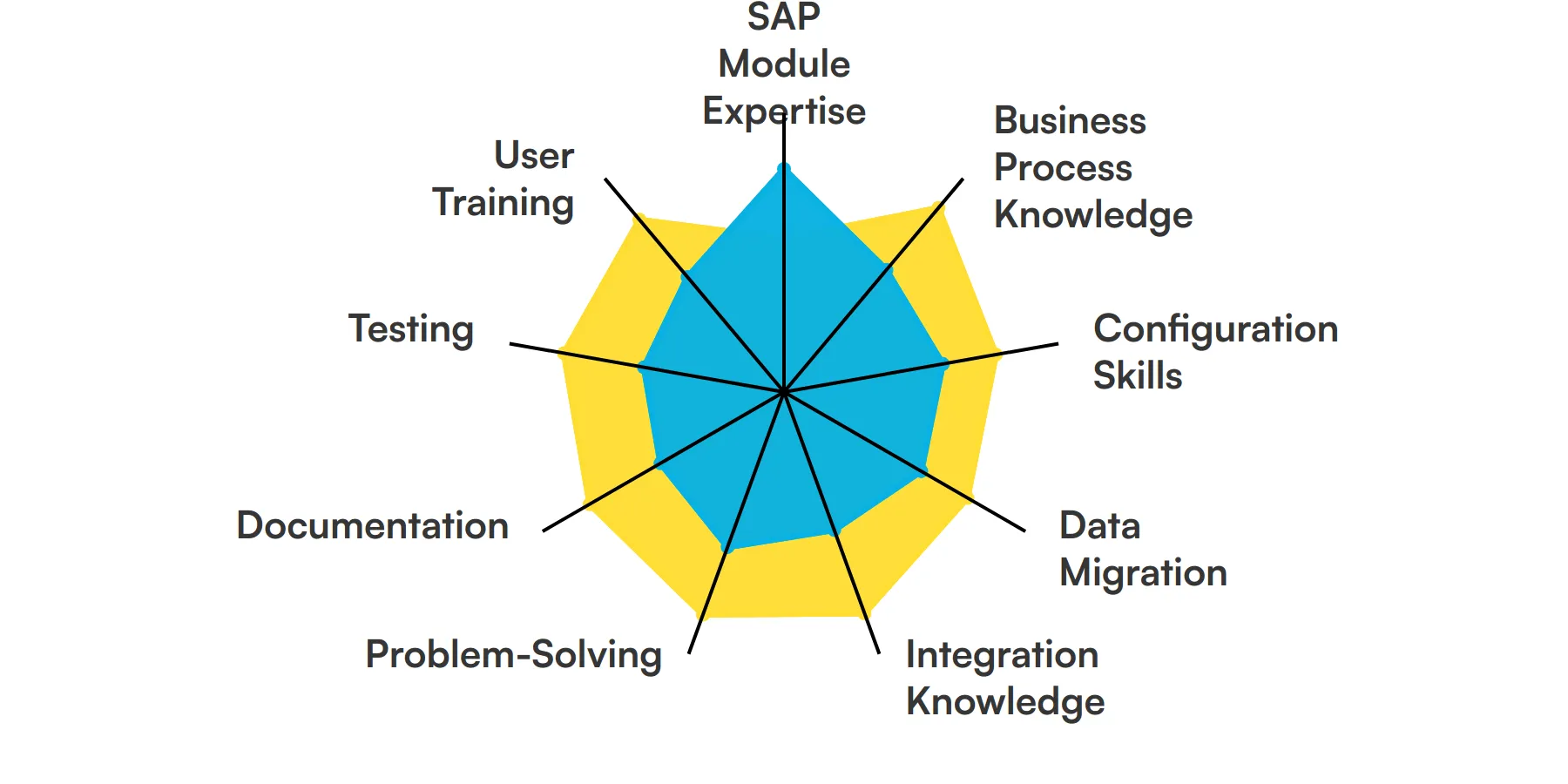
SAP Module Expertise
A deep understanding of specific SAP modules like FICO, MM, SD, or HCM is crucial. This knowledge allows the SAP Functional Consultant to configure and customize the system to meet business requirements.
For more insights, check out our guide to writing a SAP Functional Consultant Job Description.
Business Process Knowledge
Understanding the business processes relevant to the industry you are working in is key. This helps in mapping the business requirements to SAP functionalities effectively.
Configuration Skills
Being adept at configuring SAP systems to align with business needs is essential. This involves setting up various parameters and options within the SAP software to ensure it operates as required.
Data Migration
Skills in data migration are necessary for transferring data from legacy systems to SAP. This includes data extraction, transformation, and loading (ETL) processes.
Integration Knowledge
Understanding how SAP integrates with other systems is important. This ensures seamless data flow and process integration across different platforms and applications.
Check out our guide for a comprehensive list of interview questions.
Problem-Solving
Strong problem-solving skills are needed to troubleshoot and resolve issues that arise during implementation and post-go-live support. This ensures minimal disruption to business operations.
Documentation
Creating detailed documentation for configurations, processes, and user manuals is a key part of the role. This helps in maintaining a clear record of the system setup and provides guidance for end-users.
For more insights, check out our guide to writing a Technical Writer Job Description.
Testing
Conducting thorough testing of the SAP system to ensure it meets business requirements and functions correctly is crucial. This includes unit testing, integration testing, and user acceptance testing (UAT).
User Training
Providing training to end-users on how to use the SAP system effectively is an important responsibility. This ensures that users are comfortable and proficient with the new system.
10 secondary SAP Functional Consultant skills and traits
The best skills for SAP Functional Consultants include Project Management, Communication, Analytical Skills, SQL Knowledge, Change Management, Time Management, Attention to Detail, Customer Service, Adaptability and Collaboration.
Let’s dive into the details by examining the 10 secondary skills of a SAP Functional Consultant.
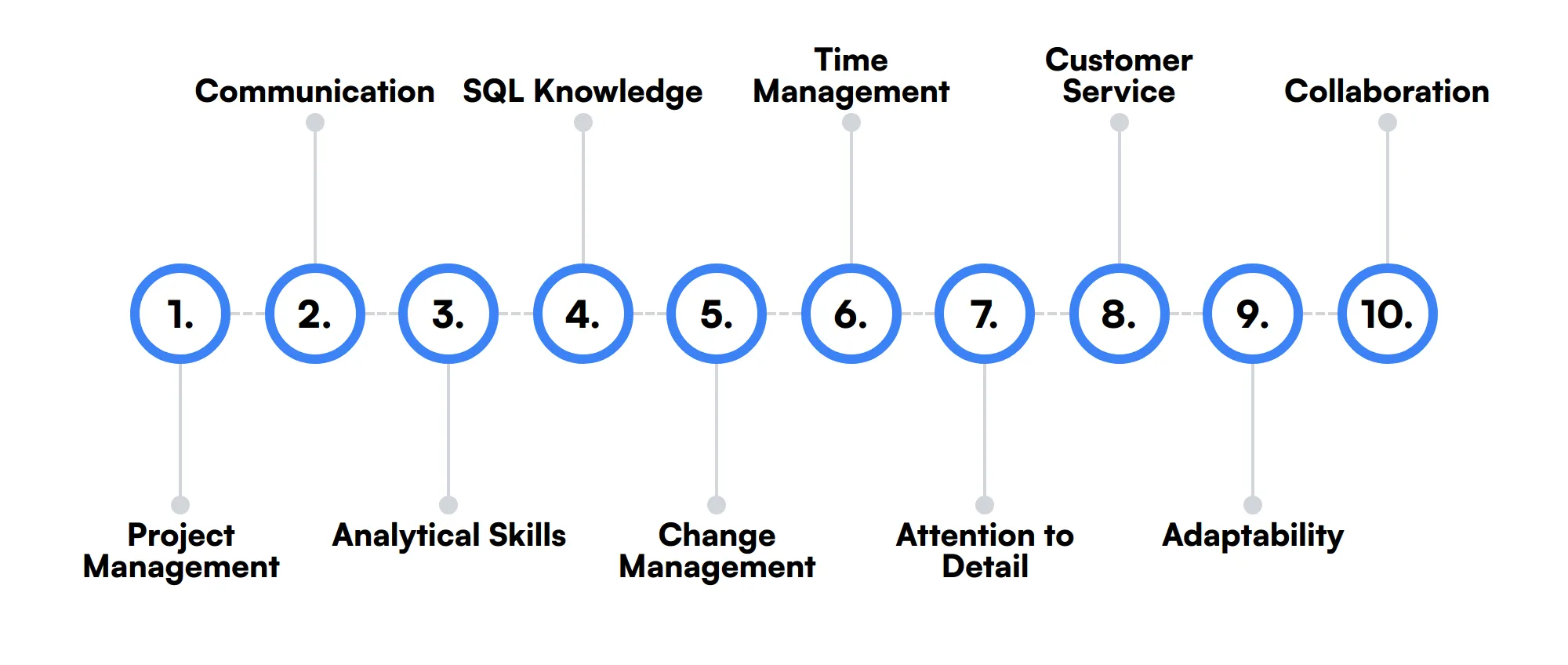
Project Management
Basic project management skills can help in planning, executing, and closing projects efficiently. This includes managing timelines, resources, and stakeholder expectations.
Communication
Effective communication skills are important for interacting with stakeholders, understanding their requirements, and explaining technical details in a clear manner.
Analytical Skills
Strong analytical skills help in understanding complex business problems and devising appropriate solutions using SAP functionalities.
SQL Knowledge
Basic knowledge of SQL can be beneficial for querying databases and understanding data structures within the SAP environment.
Change Management
Understanding change management principles can help in managing the transition to new systems and processes smoothly, ensuring minimal resistance from users.
Time Management
Good time management skills are necessary to handle multiple tasks and projects simultaneously, ensuring timely delivery of solutions.
Attention to Detail
Paying close attention to detail is important to ensure accuracy in configurations, data migration, and documentation.
Customer Service
Providing excellent customer service helps in building strong relationships with clients and ensuring their satisfaction with the SAP solutions provided.
Adaptability
Being adaptable to new technologies and changing business environments is important for staying relevant and effective in the role of an SAP Functional Consultant.
Collaboration
Working collaboratively with other team members, including technical consultants and business analysts, is essential for successful project outcomes.
How to assess SAP Functional Consultant skills and traits
Assessing the skills and traits of an SAP Functional Consultant involves more than just glancing at their resume. While resumes may highlight qualifications and certifications, they do not provide insight into a candidate's hands-on expertise with SAP modules or their ability to navigate complex business processes.
To truly understand whether a candidate will thrive in your organization, you need a method that evaluates their practical skills in areas like configuration, data migration, and user training. Skills-based assessments are a reliable way to measure these competencies.
For instance, using Adaface assessments, you can create customized tests that focus on the specific SAP modules and skills relevant to your needs. These assessments help you identify consultants who are not only proficient in theory but also demonstrate strong problem-solving and integration skills in practice. By incorporating these tests, companies have seen a 2x improvement in the quality of their hires.
Let’s look at how to assess SAP Functional Consultant skills with these 6 talent assessments.
SAP FICO Test (Financial Accounting & Controlling)
Our SAP FICO Test evaluates candidates on their technical knowledge and practical skills related to general ledger accounting, accounts payable, accounts receivable, asset accounting, financial statements, and controlling.
The test assesses their understanding of general ledger accounting, cost & profit centers, accrual engine, and financial statement versions (FSVs). It also evaluates their ability to configure and customize SAP FI to meet business requirements.
Successful candidates demonstrate proficiency in MIGO and MITO transactions, COPA records, and the MTO process.
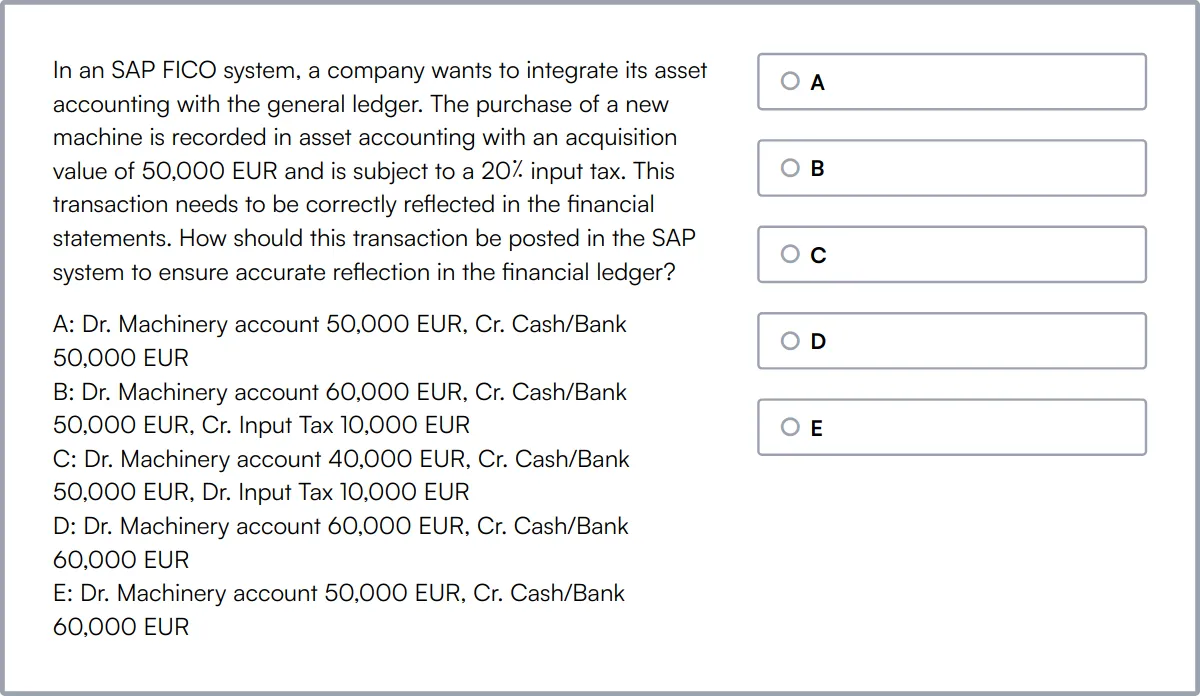
Business Analyst Test
Our Business Analyst Test evaluates candidates on their ability to identify and define business problems, gather and analyze requirements, create process models and data flows, develop use cases, and communicate effectively with stakeholders.
The test assesses their skills in data analysis, requirements gathering, data visualization, critical thinking, and problem-solving. It also includes questions on SQL fundamentals and SQL CRUD statements.
High-scoring candidates show proficiency in project management and agile methodologies.

SAP MM Online Test
Our SAP MM Online Test evaluates candidates on purchasing, inventory management, logistics, material valuation, vendor management, invoice verification, and reporting.
The test assesses their understanding of SAP MM basics, purchasing, inventory management, material requirements planning, and vendor evaluation. It also evaluates their ability to configure and customize SAP MM to meet business requirements.
Successful candidates demonstrate proficiency in master data management, invoice verification, logistics invoice verification, and release strategy.
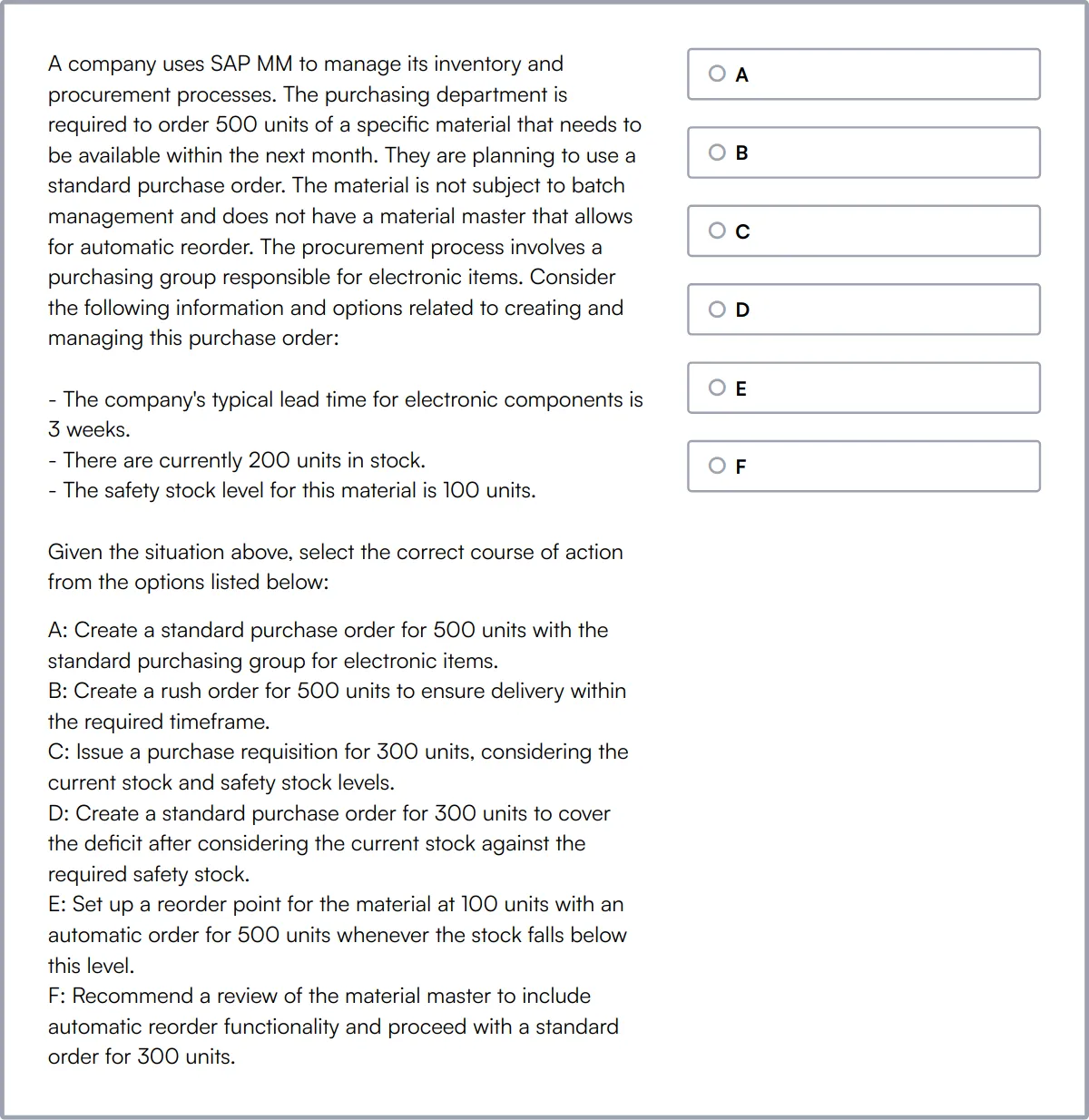
Informatica MDM Online Test
Our Informatica MDM Online Test evaluates a candidate's knowledge and understanding of various topics related to Informatica Master Data Management (MDM) software.
The test assesses their proficiency in data modeling, data quality, data integration, synchronization, and cleansing. It also evaluates their understanding of MDM Hub Store building schema, match & merge, unmerge, SIF, and metadata validation.
High-scoring candidates demonstrate a strong grasp of MDM Hub Store functionalities and metadata validation techniques.
SAP PI Online Test
Our SAP PI Online Test evaluates candidates on their knowledge of integration scenarios, mapping techniques, interface development, and message processing.
The test assesses their understanding of troubleshooting, monitoring and error handling, adapters, PI/PO architecture, and security in SAP PI/PO.
Successful candidates demonstrate proficiency in interface development and message processing.
Problem Solving Test
Our Problem Solving Test evaluates a candidate's ability to understand instructions, analyze data, and respond to complex problems or situations.
The test assesses their skills in abstract reasoning, critical thinking, deductive reasoning, inductive reasoning, pattern matching, and spatial reasoning.
High-scoring candidates show strong learning agility and coachability.
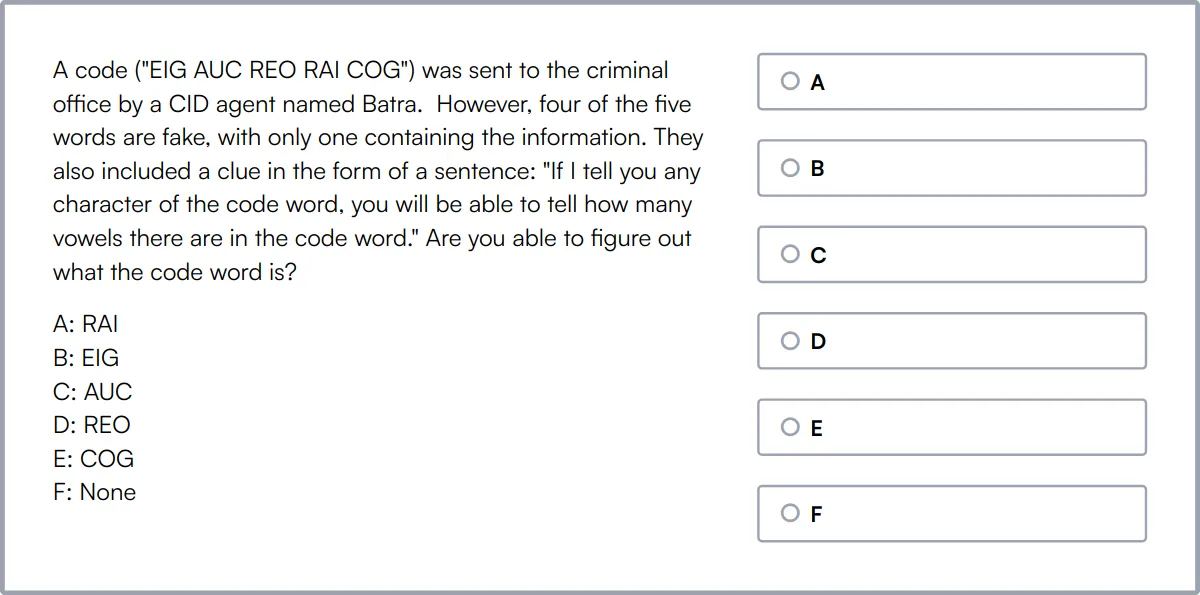
Summary: The 9 key SAP Functional Consultant skills and how to test for them
| SAP Functional Consultant skill | How to assess them |
|---|---|
| 1. SAP Module Expertise | Evaluate depth of knowledge in specific SAP modules. |
| 2. Business Process Knowledge | Assess understanding of relevant industry business processes. |
| 3. Configuration Skills | Test ability to configure SAP modules according to specifications. |
| 4. Data Migration | Review experience and strategies in transferring data to SAP systems. |
| 5. Integration Knowledge | Check capability to integrate SAP with other systems. |
| 6. Problem-Solving | Observe approach in resolving complex system issues. |
| 7. Documentation | Examine proficiency in creating clear, comprehensive system documentation. |
| 8. Testing | Assess skills in executing system tests and reporting results. |
| 9. User Training | Evaluate effectiveness in training users on new systems. |
SAP HCM Test
SAP Functional Consultant skills FAQs
What is the importance of SAP Module Expertise in a Functional Consultant role?
SAP Module Expertise ensures that the consultant can effectively configure and customize the SAP system to meet business requirements. It is the foundation for all other skills.
How can recruiters assess a candidate's Business Process Knowledge?
Recruiters can assess Business Process Knowledge by asking candidates to describe how they have mapped business processes to SAP modules in past projects. Scenario-based questions can also be useful.
What are some key indicators of strong Configuration Skills in SAP?
Key indicators include the ability to customize SAP modules, create and manage configuration documents, and troubleshoot configuration issues. Practical tests can be used to evaluate these skills.
Why is Data Migration important for an SAP Functional Consultant?
Data Migration is crucial for transferring data from legacy systems to SAP. It ensures data integrity and smooth transition during system upgrades or implementations.
How can Integration Knowledge be evaluated during the hiring process?
Integration Knowledge can be evaluated by asking candidates about their experience with SAP interfaces, middleware, and third-party systems. Technical questions on integration scenarios can also be helpful.
What role does Problem-Solving play in the SAP Functional Consultant role?
Problem-Solving is essential for identifying and resolving issues that arise during SAP implementation and maintenance. It ensures system reliability and user satisfaction.
How can recruiters test a candidate's Documentation skills?
Recruiters can ask candidates to provide samples of their previous documentation, such as configuration guides, user manuals, and process flow diagrams. Reviewing these documents can give insights into their documentation skills.
What methods can be used to assess User Training capabilities?
User Training capabilities can be assessed by asking candidates to describe their experience in conducting training sessions, developing training materials, and receiving feedback from trainees. Practical demonstrations can also be useful.
Assess and hire the best SAP Functional Consultants with Adaface
Assessing and finding the best SAP Functional Consultant is quick and easy when you use talent assessments. You can check out our product tour, sign up for our free plan to see talent assessments in action or view the demo here:

40 min skill tests.
No trick questions.
Accurate shortlisting.
We make it easy for you to find the best candidates in your pipeline with a 40 min skills test.
Try for freeRelated posts
Free resources



